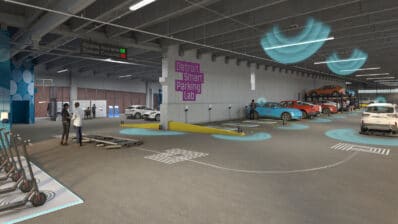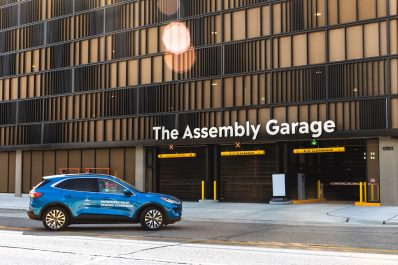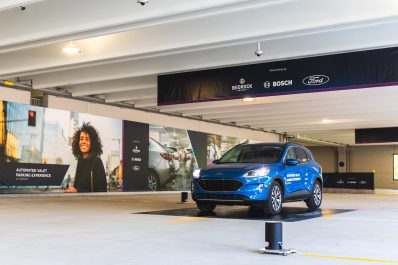A pilot program set to launch in Detroit next month will explore ways to let electrified, autonomous vehicles not only park themselves but also plug in for a quick charge.

The project, the nation’s first of its kind, will team up the State of Michigan, Ford Motor Co., German tech giant and auto supplier Bosch, car rental company Enterprise and Bedrock, a Detroit-based real estate company that is providing the test site at a multi-story garage it operates in the Motor City.
It’s the next step in a process that began last August with the same participants, but it was done on a smaller scale.
Automakers are investing billions of dollars in connected and autonomous vehicle technologies and one of the potential benefits will be the ability to have a vehicle drop off its passengers and then go find a parking spot on its own. That will be one of the key things the Detroit Smart Parking Lab, or DSPL, will focus on.
With President Joe Biden set to announce a target of having electrified vehicles account for as much as half of U.S. vehicle sales by 2030 the DSPL will also explore ways to use robots to charge future EVs.
The time before self-driving vehicles
Even before fully autonomous vehicles come to market, connected vehicles will be able to find parking spots without having to circle city streets in search of an open space, experts anticipate.

“The Detroit Smart Parking Lab will help us collaborate with other innovators on even better solutions to make parking easier, so it doesn’t spoil an evening out,” said Craig Stephens, director, Controls & Automated Systems, Ford Research and Advanced Engineering.
The DSPL will use a Bedrock parking facility in Detroit’s Corktown neighborhood — not so coincidentally located near where Ford is setting up its new autonomous, connected and electrified vehicle development center.
The project also will be used by Enterprise to see how connected and autonomous technology could be used in the future to check rentals back in, service and refuel — recharge — them, speeding up the turnaround process.
“Participation in the DSPL project allows Enterprise to explore the feasibility and viability of autonomous, connected, and electrified mobility innovations,” said Chris Grayson, regional vice president at Enterprise in Detroit. “As consumer demand and infrastructure viability increases in the coming years, these types of vehicle technology will play an increasingly important role in both the future of sustainable mobility overall and our fleet at Enterprise.”
Getting some real-world experience

Day-to-day operation of the parking lab will be managed by the American Center for Mobility, a non-profit based in the Detroit suburb of Ypsilanti, Michigan. The ACM already operates a 500-acre smart mobility complex alongside the Willow Run Airport.
The center has been designed to simulate a real-world environment, running the parking lab program in downtown Detroit will allow the partners to experience crowded urban conditions, “enabling further development of new mobility innovations,” said Reuben Sakar, ACM’s president and CEO.
There’s ongoing debate about the speed with which fully autonomous vehicles will come to market, but several automakers already offer limited hands-free operations. Ford will join that club when it launches its Blue Cruise system later this year.
A number of automakers now offer features permitting vehicles to automatically slide in and out of parking spots without a driver behind the wheel. And several manufacturers are developing systems that could permit their vehicles to drop off passengers and then find a parking space in a lot or garage using connected technologies.
Connected systems are already in use in some markets, alerting motorists to where they can find an available spot.







